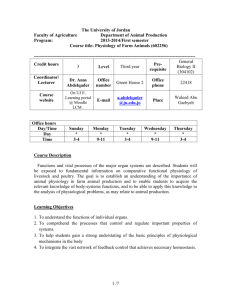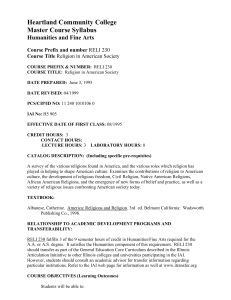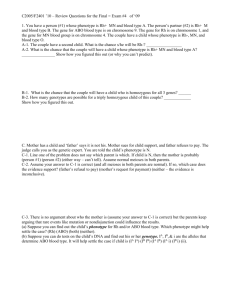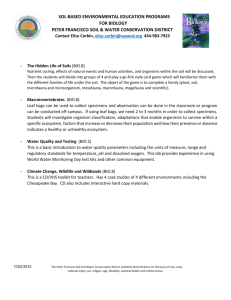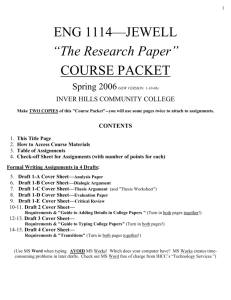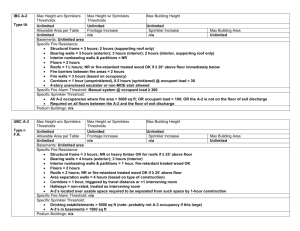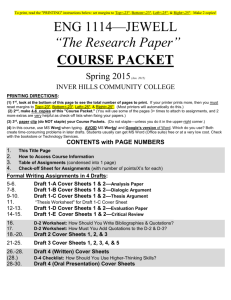Environmental Economics (0605445) ILO`s
advertisement
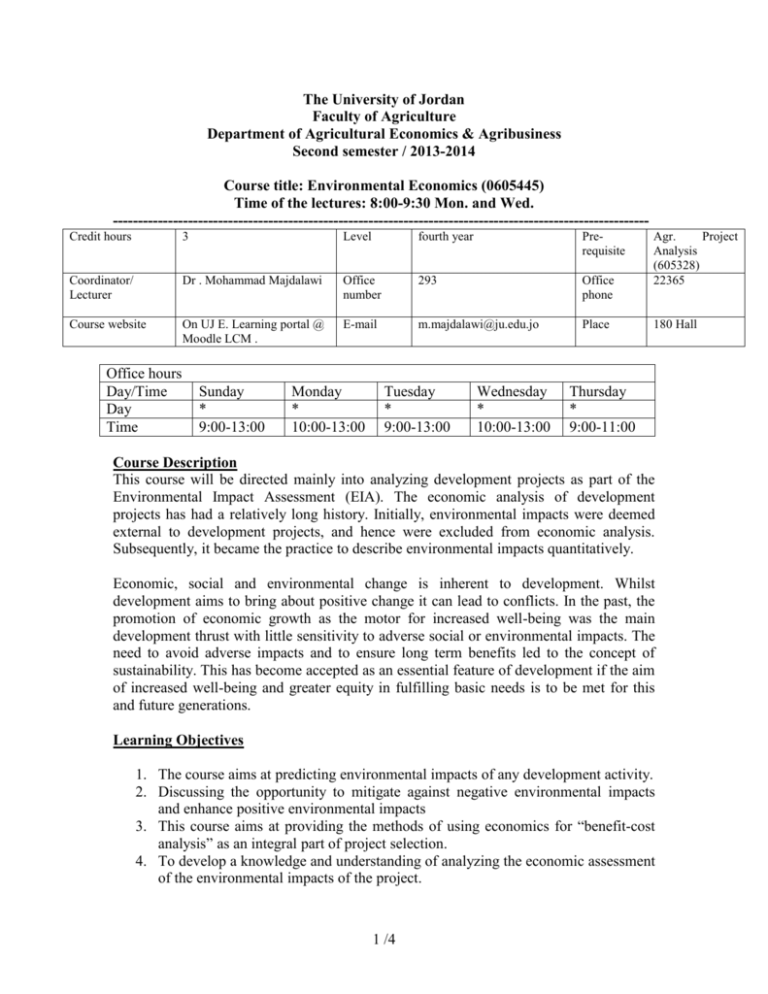
The University of Jordan Faculty of Agriculture Department of Agricultural Economics & Agribusiness Second semester / 2013-2014 Course title: Environmental Economics (0605445) Time of the lectures: 8:00-9:30 Mon. and Wed. ----------------------------------------------------------------------------------------------------------Credit hours 3 Level fourth year Prerequisite Coordinator/ Lecturer Dr . Mohammad Majdalawi Office number 293 Office phone Course website On UJ E. Learning portal @ Moodle LCM . E-mail m.majdalawi@ju.edu.jo Place Office hours Day/Time Day Time Sunday * 9:00-13:00 Monday * 10:00-13:00 Tuesday * 9:00-13:00 Wednesday * 10:00-13:00 Agr. Project Analysis (605328) 22365 180 Hall Thursday * 9:00-11:00 Course Description This course will be directed mainly into analyzing development projects as part of the Environmental Impact Assessment (EIA). The economic analysis of development projects has had a relatively long history. Initially, environmental impacts were deemed external to development projects, and hence were excluded from economic analysis. Subsequently, it became the practice to describe environmental impacts quantitatively. Economic, social and environmental change is inherent to development. Whilst development aims to bring about positive change it can lead to conflicts. In the past, the promotion of economic growth as the motor for increased well-being was the main development thrust with little sensitivity to adverse social or environmental impacts. The need to avoid adverse impacts and to ensure long term benefits led to the concept of sustainability. This has become accepted as an essential feature of development if the aim of increased well-being and greater equity in fulfilling basic needs is to be met for this and future generations. Learning Objectives 1. The course aims at predicting environmental impacts of any development activity. 2. Discussing the opportunity to mitigate against negative environmental impacts and enhance positive environmental impacts 3. This course aims at providing the methods of using economics for “benefit-cost analysis” as an integral part of project selection. 4. To develop a knowledge and understanding of analyzing the economic assessment of the environmental impacts of the project. 1 /4 Intended Learning Outcomes (ILOs): Successful completion of the course should lead to the following outcomes: A. Knowledge and Understanding: Student is expected to A1-Be able to discuss/ explain the environmental impacts of any agriculture activities. A2- Be able to use economic analysis as policy tools and instruments. A3- Understand the use of public policies and support programs in influencing environmental actions by developers, manufactures, farmers and consumers. A4- Understand the difference between financial and economic appraisal for development projects. A5- Understand the interrelationships between environment and economics. B. Intellectual Analytical and Cognitive Skills: Student is expected to B1- Employ analytical skills to be used to quantify the environmental impacts and interpret of quantified results. B2- has the skills to estimate the consumer and producer surplus. B3- analyzes and estimates the external cost and benefit. C. Subject- Specific Skills: Students is expected to C1- Analyze the environmental impact of agricultural activities. C2- Apply different environmental methods to quantify the impact of agricultural activities. C3- Use appropriate economics support tools. C4: Use the environmental economics literature effectively. D. Transferable Key Skills: Students is expected to D1- Gain basic concepts and knowledge of environmental impact. D2- Create self-reliance and team work when necessary. D3- Display personal responsibility to the course requirements ILOs: Learning and Evaluation Methods ILO/s Learning Methods A. Knowledge and Understanding (A1-A3) B. Intellectual Analytical and Cognitive Skills (B1-B3) C. Subject Specific Skills (C1-C4) D. Transferable Key Skills (D1-D3) Evaluation Methods Lectures and Discussions Exams. Lectures and Discussions Exams and project. Lectures and Discussions Project and presentation. Project and presentation. Lectures and Discussions 2 /4 Course Contents WEEK Sources Introduction Financial and Economic Analysis of Agriculture Projects Environment Impact Analysis (EIA) ILOs A-1 Easter K. and J. Waelti. A-2, A-3, A-4 D-1 Bindu N. Lohani A-1, A-2, A-5 D-1 5-6 Consumer and producer surplus G. Edwards-Jones 7 Welfare Economics G. Edwards-Jones A-2, A-3, A-3 B-1, B-2 C-2 , C-4 D-1, D-2, D-3 A-2, A-3 B-1, B-2 C-1, C-3, C-4 D-1, D-2, D-3 Externalities and Market Failure G. Edwards-Jones A-2, A-3 B-1 C-2, C-4 D-1, D-2, D-3 The World Bank A-2, A-3, A-5 B-1, B-3 C-2, C-4 D-1, D-2, D-3 Bindu N. Lohani A-2, A-3 C-1, C-3, C-4 D-1, D-2, D-3 1 2 3+4 8+9 SUBJECT 10-13 Environmental Valuation Methods 14 Social Impact Assessment (SIA). A-1, A-3 B-1, B-3 C-1, C-2, C-4 D-1, D-2, D-3 15-16 Case studies and Term papers presentations. Learning Methodology The course will be structured in lectures, discussions, working group and exercises. The course comprises overviews, from general understanding to expert knowledge on key topics, and learning is based on lectures as well as independent learning through exercises and examples. Actual participation in class work is a very important part of students learning experience in this course. So students are expected to come and to be prepared to do the work, ask questions and fully engaged with the course. Evaluation Point % Date Midterm Exam 25% Project and presentation 25% Final Exam 50% 14/04/2014 Will be announcing from register. 3 /4 TEXT BOOKS 1-Techniques to Value Environmental Resources: an Introductory Handbook. http://www.erin.gov.au/portfolio/esd/handbook/trct.html 2-Bindu N. Lohani, J. Warren Evans, Robert R. Everitt, Harvey Ludwig, Richard A. Carpenter Shih-Liang Tu. Environmental Impact Assessment for Developing Countries in Asia: Volume 1 – Overview. Asian Development Bank. 1997 . REFERENCES AND OTHER READING MATERIAL 1. Easter K. and J. Waelti. "The Application of Project Analysis to Natural Resource Decisions", Water Resources Research Center, University of Minnesota, Graduate School, Minneapolis, Minnesota, 1980. 2. G. Edwards-Jones, Environmental and sustainability issues in agricultural policy analysis and planning, Training Materials for Agricultural Planning, FAO, RENA, 1996 3. Ministry of Municipal and Rural Affairs & Environment, Dept. of Environment " National Environment Strategy for Jordan: A Resource Book of Information and Guidelines for Action", Amman, Jordan, 1991. 4. Ministry of Environment, "National Biodiversity Strategy and Action Plan”, Amman, Jordan. May 2003. 5. Pearce D. and R. Turner, "Economics of Natural Resources and the Environment" The Johns Hopkins University Press, Baltimore, Maryland, USA, 1991 6. Dixon, John A. et al. "Economic Analysis of The Environmental Impacts of Development Projects" The Asian Development Bank, Manila, Philippines, 1986 7. The World Bank. Social Analysis Sourcebook. http://www.worldbank.org/socialanalysissourcebook/ Notes: Concerns or complaints should be expressed in the first instance to the module lecturer; if no resolution is forthcoming, then the issue should be brought to the attention of the module coordinator (for multiple sections) who will take the concerns to the module representative meeting. Thereafter, problems are dealt with by the Department Chair and if still unresolved the Dean and then ultimately the Vice President. For final complaints, there will be a committee to review grading the final exam. For more details on University regulations please visit: http://www.ju.edu.jo/rules/index.htm 4 /4

